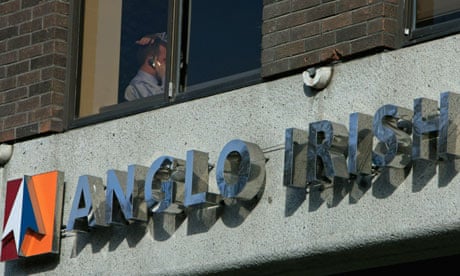A Belfast businessman has made complaints to police on both sides of the Irish border that one of the republic's state-rescued banks offered him around €1m, which in turn would have deprived the UK tax office of its share of €3m.
A potential Garda Siochána inquiry into the continuing battle between property investor Peter Curistan and the former Anglo Irish Bank has raised the prospect of the republic's police force carrying out a criminal investigation into a financial institution owned by its own government.
Curistan is fighting several legal battles with the bank. It has emerged that one of the claims, relating to a hearing in Dublin last year, alleges that a senior executive at Anglo Irish offered Curistan £750,000 to dissolve his property company Sheridan Millennium Ltd and thus "burn" his main creditors – Her Majesty's Revenue and Customs (HMRC).
The offer of the money has now been reported as a criminal complaint to the Garda Siochána and the Police Service of Northern Ireland (PSNI).
Anglo Irish was the bank that almost bankrupted Ireland after the financial crash of 2008. It had become the preferred bank of property developers and speculators, who used billions of loans to fuel the republic's booming commercial sector and housing market. Anglo Irish and other banks were accused of encouraging speculation that left the country saddled with huge bank debts, and resulted in the EU/International Monetary Fund bailout.
The fallout from Anglo's collapse has already included the virtual destruction of a business empire controlled by Ireland's one-time richest man, Sean Quinn, who borrowed heavily from the bank in the Celtic Tiger years.
Like Quinn, Curistan has tried to fight back against attempts by the now state-owned bank – now known as the Irish Bank Resolution Corporation (IBRC) – to seize his assets. Unlike Quinn, the former Hong Kong-based entrepreneur is seeking to turn a financial battle in the courts into a criminal inquiry.
He said: "The reason why they [IBRC] did this was because as part of a plan to dispose of the Odyssey Pavilion [an entertainment venue in Belfast], the bank had agreed to pay almost €3m [to] creditors, of which HMRC was owed a considerable amount. The €1m was to encourage me to wind up the company without the bank then needing to make those commitments. Clearly I was totally shocked at how a state-owned bank could blatantly asked me to partake in such activity.
"As a fellow of the Institute of Chartered Accountants in Ireland, I had a duty to report allegations of criminal activity to the appropriate authorities. And this is why both the PSNI and the Garda have been informed of this in recent weeks," he said.
During a case heard last March and April in Dublin's high court, the IBRC was seeking to seize a property Curistan owned in the Irish capital. A letter was read out in open court that suggested he dispose of another property in Belfast – the Odyssey Pavilion on the river Lagan. The entertainment centre was under the control of Sheridan Millennium, a Curistan-owned company at the time.
An account of a recorded mobile phone conversation between Curistan and the Anglo Irish Bank/IBRC official Joe McWilliams was read out in court. Before nationalisation, McWilliams was a director of lending (Ireland) in the Anglo Irish Bank.
The record of the phone call stated: "He [McWilliams] rang my mobile at approximately 5pm on Tuesday 3 February 2009. He stated that he had a thought that it may be better to wind up Sheridan Millennium now as he felt there would be continual pressure on the Sheridan Group in the future which may eventually lead to winding up.
"He went on to suggest that I should be given an incentive to the tune of £500-750,000 to have in my back pocket.."
Under cross-examination in open court by Curistan (who represented himself) in front of Mr Justice Charleton, McWilliams was asked under oath if he would disagree with that account of the phone conversation. To which McWilliams replied: "No, that was fairly accurate." However, he did not confirm the precise amount offered to Curistan.
Charleton asked why it was necessary to pay Curistan anything to wind up Sheridan Millennium. "The normal rule in corporate law is, there is no cakes and ale except for the benefit of the corporation," said Charleton.
"The normal rule in corporate law – Anglo is a corporation – the corporation is not entitled to spend money on anything which doesn't give the corporation a benefit or a potential benefit. It includes, in terms of commerce, that a corporation doesn't have the capacity to simply give away money.
"I still can't understand why you would actually pay money, three-quarters of a million pounds, that's nearly €1m, to Mr Curistan for his back pocket. I appreciate it is less than the €3m you would lend to him for the purpose of dealing with his creditors so that Sheridan Millennium would be able to carry on for a time until you could get an orderly takeover. Windups cause loss to creditors."
A spokesman for the IBRC said it would not comment on Curistan's complaint to the two police forces or the content of the court transcripts because the bank is currently involved in litigation with him.
